#Ianthe IS the main character (in her perspective)
Text
The Antagonists of The Locked Tomb Series
I've been making posts arguing that John Gaius isn't the antagonist of The Locked Tomb series, so I thought I'd do a post breaking down the question: who are the antagonists of the series?
Alright, to start: the protagonist is the character the book is about. They may not be the same thing as the POV character. For example, Harrow the Ninth is told from the perspective of Gideon, but the protagonist - at least until the end - is Harrow. The antagonist is the character opposed to the protagonist. Neither of these are synonymous with "hero" or "villain".
The Protagonists of the Locked Tomb Series, by Book
Gideon the Ninth: Gideon Nav
Harrow the Ninth: Harrow, then Gideon at the end
Nona the Ninth: Nona for the New Rho portions, and John for the pre-Resurrection portions
Alright, so what do our protagonists want in those books?
Gideon the Ninth: Gideon wants to join the Cohort at the start. In the middle, she starts to get on board with the plan of Harrow becoming a Lyctor. As the bodies start to stack up, Gideon's goal is to Protect Everyone.
Harrow the Ninth: Harrow wants to achieve full Lyctorhood. She wants to not get killed by G1deon. And she wants to stop Commander Wake in the River Bubble portions.
Then Gideon wants Harrow to fully consume her and become a full Lyctor.
Nona the Ninth: Nona wants to have a birthday party. More broadly, she wants those she cares about to be happy.
John wants to save the world and then to stop the trillionaires from abandoning it.
Now, who's opposed to the protagonists' goals?
Gideon the Ninth: Harrow is opposed to Gideon joining the Cohort. Cytherea is opposed to Harrow becoming a Lyctor and to everyone not dying.
Harrow the Ninth: Harrow is opposed to Harrow becoming a full Lyctor, although due to the magical brain lesion, Harrow doesn't know this. Technically, G1deon isn't actually trying to kill Harrow; he's trying to force her into full Lyctorhood by attacking her. He's acting on John's orders, with John wanting Harrow to become a full Lyctor, which if she doesn't do, she's going to get eaten by Varun. Wake wants to kill everyone in the River Bubble.
Harrow is opposed to Harrow fully consuming Gideon.
Oh, also Mercymore and Augustine are trying to kill John, but that's, like, almost completely separate from Harrow and Gideon's goals. Mercymorn and Augustine agree to help Harrow kill G1deon because that'll deprive John of an important ally, and Gideon thinks that Ianthe should have let John be eaten by the Stoma, but our two protagonists just do not have an active role in what is ultimately the climax of the book.
Nona the Ninth: Nona is dying, so the main obstacle to her having a birthday celebration isn't an antagonist character. For her broader goals, Varun wanting to eat the planet will make her loved ones unhappy.
The trillionaires are implied to be responsible for the funding to John's project being cut, in that once they realized they could save themselves, they didn't have a motivation to trying to save everyone. And the trillionaires are opposed to John's goal of not letting them abandon the planet.
So where will things go with Alecto the Ninth?
Well, Alecto will presumably be the primary protagonist, although there's the possibility of the book having a secondary protagonist.
What will be Alecto's goals? Well, I don't think we have everything yet, but so far, she wants to serve Harrow and stab John. She also talks about John teaching her how to die, so "die" might be on her list of goals.
Who is opposed to those goals? Well, Gideon's opposed to Alecto serving Harrow. John responds to her stabbing him by bidding her good morning, so he doesn't seem particularly opposed to her goal of stabbing him.
What about dying? We're told that Alecto and John can only die if both of them die. Well, John told Gideon to kill Alecto because that would render him mortal, allowing him to die and Gideon to succeed him.
But Ianthe thinks that John is lying to Gideon there, and he didn't seem particularly surprised to find Alecto not dead (and stabbing him). There are some hints that what John actually wants is to do a big reset on the universe, wiping everyone's memories and starting anew.
I personally think that "the Earth dies and everyone in the solar system has to leave their home or die" would make for a very bleak ending. And, like, endings don't have to be happy to be satisfying, but if Muir goes that route, it'd give the series one hell of a downer ending, is all I'm saying.
Now, the protagonists have changed goals in the first three books, so it's quite possible that Alecto's goal of dying will be re-evaluated. It's possible that the Devils will be the primary antagonist of the books, or that the primary antagonist will be a character we haven't met yet.
#the locked tomb#meta#john gaius#gideon the ninth#harrow the ninth#nona the ninth#alecto the ninth#gideon nav#harrowhark nonagesimus#nona palona#alecto the first
39 notes
·
View notes
Text
thoughts on gideon the ninth chapter thirty-five
lmao that's rough gideon. i'd feel like shit if i did that to someone too, even if it's not actually a bad thing to do and not your fault.
okay, it was dulcinea who killed people. yeah, that's better than ianthe. sorry for jumping the gun and blaming ianthe, last chapter. i did realize she wasn't implying it was her who did the killing midway through, though.
i maintain that this still isn't wholly surprising — the sick one, the one you'd never suspect, did it? wow, exactly what i'd expect — and making it harrow could have been a really bold and interesting move, but it works.
ohhh, it wasn't dulcinea septimus. okay, i see. not following why abigail's interest in history made her a threat, but we can keep going. the details of who she is (someone from the same family) are a bit hard to follow, but okay — she kept the corpse around and burned it with protesilaus's.
okay. this person wanted to get the emperor to come back to the system and fuck with him. who are the Hands? and now she wants to get rid of the houses while he waits, and then do... something to him?
oh this is a lyctor, huh. interesting.
oh and palamedes is already killing her
did palamedes just blow himself up?
that's a shame. he was my favorite character.
damn she really did vomit up a lung.
Cytherea the First, huh. soon to be Cytherea the dead, I hope.
Okay. I'd appreciate if any of the people who have been commenting on my post could tell me the foreshadowing for Dulcinea being the murderer, and Dulcinea not being Dulcinea. By the way, I appreciate all of your comments a ton, even though I haven't been replying (because apparently tumblr doesn't let you reply with your sideblog and using my main while mentioning I'm OP just kinda seemed like a hassle).
From a mystery perspective, I don't love this answer. I want two things for a mystery answer: One, to feel like it ties together so many pieces of evidence and foreshadowing that I realize I should have realized it all along and feel dumb. Two, ideally, for it to expand my perception of what is even possible as answer, which is pretty rare. Something like Knives Out, that treats the entire role of culprit in a unique way.
This is why I got really hyped up for the Harrow theory; I feel like her plot role was one you'd never expect to be the culprit and thus it'd be mindblowing if it was. I think it being not-Dulcinea is considerably more... regular, as a thing for a mystery story to do. I mean, I kind of called it early on that it could very well be her, since it would cause the most emotional pain for Gideon. I don't get credit for being right, because when it came time for me to put my money where my mouth is, I didn't say it was her. But like I said earlier, the sick, unassuming character? Kind of becomes just plain old assuming.
But that's just my preferences and personal expectations being projected onto a book that didn't necessarily need to conform to my ideas, and it works narratively nonetheless. I mean, clearly it does. And I hope that knowing what the foreshadowing is will enhance my appreciation. Plus, I don't even know what she did to kill Jeannemary and Isaac yet! Hope that's interesting.
From an entirely different perspective, though, this reveal is awesome. I love stories that start as one thing, only to unfold into something much bigger and more complex. That's something I like even more than the answer to the mystery being something I never would have considered — when the direction of the plot itself is like that. This started as a story about a bunch of people solving puzzles in a facility, but Dulcinea actually being Cytherea, a Lyctor, suddenly thrusts this story into something WAY bigger. There are so many questions I don't even understand well enough to ask, about the Houses, the history here, the emperor, the hands, the Lyctors, everything that's going on! This is a huge game that's being played and I am seriously looking forward to all the insane things I'd never expect that the next book will likely do. The possibilities are genuinely endless in my mind, of what this story will even be about, and that's a feeling I love. That, more than anything else, is the best thing you could take in inspiration from Homestuck and Umineko.
I'll hopefully finish the book tomorrow, but I seriously need to sleep now.
21 notes
·
View notes
Note
i also don't know if this is an unpopular opinion, but: I felt like the "mundane" scenes in ntn were actually some of the most interesting and thematically relevant parts of the whole. the way the sections about the new rho refugees are paired with john telling his story as a series of "necessary evils" was especially compelling to me -- it feels like all of the consequences of his/the empire's power are finally being revealed, and one of the worst consequences is that kids are still being traumatized by war and displacement in the same ways they were on pre-apocalypse earth. i feel like that's why new rho had to feel so "familiar" and "modern-day" compared to the fantasy vibes of the nine houses. like, until ntn we had no clear picture of what the rest of the empire looks like, or even what war(s) the cohort is involved in. but then when you find out, it hits you that for the average subject of the empire, there's no "heroic" interpretation of anything necros and cavs train to do -- they're nothing but parts of the machine that's constantly destroying people's lives. and this pov is presented as just as important as that of the main characters! idk, it's a jarring shift and the pacing is pretty off-putting, but it worked for me (thematically and emotionally).
another thought: when harrow and mercy were off killing planets, there was no indication that humans lived on any of them, iirc, but in ntn it's revealed that lyctors have forced large numbers of people off of their home planets. so were john & co. lying to the new lyctors about that, or is it just considered normal/justified in-universe and not worth mentioning? in any case, harrow seemed really disconnected from what killing a planet means (in htn), and i feel like that could end up being a big deal when we get back to her perspective. especially given that she's finally interacting with alecto
I love this ask, thank you. I think a lot about this post about John and Kevin, two kids playing with dolls ten thousand years and a galaxy apart. Humanity is fundamentally the same; there's love and there's bad everywhere. Both John (duh) and BoE ("necromancy is a disease you released" don't get that).
On John's revenge: the thing is, the Cohort isn't killing people. Like, they definitely don't mind killing people, but it's not their primary mission by far. John could literally kill millions in a heartbeat if his objective was extermination. He could have sent the Lyctors to wipe out entire planets generations earlier. Instead, he's using the Cohort and the resources of the Houses to drive the population of the occupied planets from place to place, over and over. He's dooming the descendants of those who left earth "on dollar store support" to a perpetual hell as climate refugees. Like Augustine says, it's purely symbolic retribution.
(IMO, this quest has an end point and we would have been in the home stretch no matter what; this is more of a verge into theoryland, but I think he does have a plan and a time limit, and he's playing capricious deity biding his time. After that, it's reboot, and maybe (?) actually letting go. Something something forgiveness not so hard nor anger long. This time will be the time we get it right.)
On Harrow & co killing planet: I think HtN actually lays the difference out pretty cleary! They were killing all planets on the path of Varun (so he couldn't kill them first and absorb them). When a Lyctor kills a planet, it's immediate. The Cohort does it to make it easier for necromancers to use thanergy; we don't know the specifics but I'm pretty sure it's fucked up (since John, of all people, says that the way Lyctors do it is "kinder"). Anyway, dead planets can no longer support native lifeforms, but iirc the process takes a long time to complete. Ianthe says that New Rho was "settled" 700 years earlier; what I'm assuming happened is that all planets in a given corner of space are "flipped" within a very short timeframe, remain viable for life for a few generations, and then probably become inhospitable for native lifeform all around the same time and everyone needs to be evacuated. I THINK they can be resettled after, but like, the entire biosphere is fucked.
#Anonymous#ntn#tlt#tlt thoughts#ejg#me every time i have a john emotion: TERRIBLE GUY (affectionate)
24 notes
·
View notes
Text
If anyone wants to read my essay on queerness in TLT that turned into a nonsensical ramble and went 450 words over the word count, I'll put it under the cut. Yes I'm an English major yes my citations are incorrect FUCK YOU.
Queerness in Tamsyn Muir’s The Locked Tomb Series
According to queer criticism, queerness of media goes beyond just the characters being queer (though that is, unfortunately, still very rare in media, even today). Queerness in media can be examined, yes through queer characters, but also the text itself presenting queer themes, subtle queercoded signals, and general deviance from the norm in media or transgressiveness (Tyson). With that being said The Locked Tomb series is likely one of the queerest sets of books ever put to print. A vast majority of its main characters and side characters are queer; hell, God himself in the series, or John (dubbed “Jod” by the fandom), is a bisexual man. The series takes place in a world where queerness is normalized. Relationships and gender in the series are both treated very flippantly in regard to “Rules.” The series itself is incredibly fluid in its identity and storytelling. With all of these elements combined, The Locked Tomb series becomes a hell of a ride. The way the series explores and defies genre, gender and relationships is a refreshing and oftentimes confusing break from the norm.
Confusing in that nine times out of ten, neither the reader nor the characters have any clue what the hell is going on. The Locked Tomb does not limit itself to being only one thing. Even its title was in flux, frequently referred to in the past as “The Locked Tomb Trilogy” ; it has now been confirmed to instead have four books. The three that have been released as this paper is being written, in order: Gideon the Ninth, Harrow the Ninth and Nona the Ninth all have entirely different tones and are arguably all entirely different genres, all tied together only by the characters, who themselves undergo significant changes throughout the story, often changing names, titles and or bodies.
Gideon follows the titular Gideon Nav as she, for the promise of her freedom, becomes the unwilling cavalier to her necromancer and lifelong ‘Enemies-to-almost-lovers” frenemy, Harrowhark. Harrow, trying to save her dying house ( house meaning planet, and or country), wants to become a Lyctor, essentially an immortal angel of Jod. The book in the beginning is a light sci-fi fantasy and a magical-school-esque story. A wacky cast of characters is introduced and they explore the ruins of an ancient castle and enter dangerous, forbidden areas to complete challenges. Things take a turn for the worst, and it becomes a tense murder mystery as cavalier and necromancer teams start turning up mangled and dead. Then, around the last act it becomes something else entirely as the hardcore lore shows up and starts flying over the audience’s head. Said lore, who although this is unimportant is named Cytherea, causes Gideon Nav to sacrifice herself and force Harrow to absorb her soul and become a Lyctor.
The second, Harrow, is hard to describe. It is a tense waiting game filled with family drama between a group of 10,000 year old people, Jod and his original Lyctors, and their two new recruits, Harrow and another necromancer from the first book, Ianthe. An ancient, terrible monster is making its slow approach intent on killing them all. All of this is told from the point of view of Harrow who gave herself a homemade lobotomy and spends most of her time puking and being haunted by either hallucinations or a ghost. The story cuts back and forth between the antics of said messed up family, told in the second person from Harrow’s POV. That, and a bastardized retelling of the events of the Gideon, also from Harrow’s perspective, but told in the third person. These semi-flashbacks are Harrow’s cut up brain attempting to regain its memory while accounting for the absence of Gideon Nav, who she tried very hard to forget (as well as a malevolent ghost haunting her, different from the hallucination ghost, but that gets complicated).
The third, Nona, becomes a post-apocalyptic story twice over. It is told from the perspective of an unknown soul in Harrow’s body, Nona, and her found-family living on a dying refugee camp hell-planet. This is interjected with weird “Dreams” Nona is having, titled like biblical chapters (“John:16”), where Harrow converses with Jod. The audience knew that Jod resurrected the world, this has been a fact from the beginning of the series, but it is through these chapters with Jod that they learn not only that he destroyed it, but that it is their world that he destroyed. Thanks to a brief period where Jod himself was dead towards the end of Harrow, the world is dying again. The nine houses as the reader came to know them by the end of Gideon are gone. The majority of necromancers and their cavaliers, and other peoples from the houses, have been killed and everyone left in that corner of the universe is huddled on refugee camp planets waiting to be shuffled off to the next one. In this way it is not just a post apocalypse story where the reader sees the distant, forever scarred but not still freshly bleeding world, but as well a story where the reader is up close and personal with a very real new apocalypse. One that is threatening to destroy that same world again. As mentioned, the books can feel almost like they belong in separate series, it is the characters and their messy, complicated relationships that keep the series connected.
Cavalier and Necromancer relationships often teeter on boundaries. The first and most prominent example is that of Gideon Nav and Harrowhark. Their relationship is explicitly romantic but it also isn’t. The two grew up together as the only two surviving children of their house (house here meaning, planet or country). They also explicitly hated one another to the point of physical violence, while simultaneously having an obsessive, codependent relationship. Gideon killed herself to force Harrow’s hand and make her become a Lyctor to save herself. Harrow cared for Gideon enough to give herself a lobotomy to avoid completely absorbing her soul. However, while the two almost explicitly love one another romantically, Harrow is actually explicitly in love with someone else. That someone else just happens to be a 10,000 year old corpse and the soul of the earth (who has too many names) incarnate. Harrow has been in love with, more accurately obsessed with, the body of Alecto, or Annabell Lee, since she was 10 years old. Gideon knows this and knows that this means she does not have a chance. In a heartbreaking line towards the end of Harrow Gideon declares she does not care, it doesn’t matter that she will never be Harrow’s lover, she’s something more important, she’s her cavalier (Muir, Harrow). Other examples of relationships that cross boundaries include that of Camila and Palamedes, two characters from Gideon that become very important in Nona (they are a part of Nona’s family). Camila and Palamedes are the cavalier and necromancer of the sixth house and are a healthier version of Gideon and Harrow. Although, they are explicitly platonic with no hint of romance or perhaps they could be read as a queer-platonic relationship. A queer-platonic relationship is a relationship that is not explicitly romantic or platonic and is outside of those defined boundaries; they are often between, but not limited to, aromantic individuals. The two are extremely dependent on one another and after Palamedes’s death in Gideon, Camila becomes obsessed with getting him back. By Nona the two are both sharing Camila’s body, and by the end of Nona they find a perfect version of Lyctorhood, wherein no soul becomes absorbed and lost forever, but instead the two become one, and they become a new person entirely. Beyond that there is Ianthe and Coronabeth, a pair of twin sisters with a deeply codependent and toxic relationship that has very unfortunate incestuous undertones. They are prime examples of both the “Same Sex Doubles” trope and of “Transgressive sexuality” (Tyson). Another example of transgressive sexuality to be found is Jod and his polycule, who although are coded as a found family unit with Jod as the father figure have spent the last 10,000 years dating and sleeping with one another. There is also the case of Gideon the First, Pyrrha Dve and Commander Wake. Gideon the first and Pyrrha were original Lyctors, but like most, did not do the process right. This meant that both Gideon and Pyrrha’s souls were alive in Gideon’s body and fighting for control at any given time. In an utterly bizarre relationship dynamic, they both wound up dating the same person, Wake.
On the subject of Pyrrha, The Locked Tomb is a series that is quite flippant with gender, nowhere is this more prominent than in Nona. Characters like Gideon (or Kiriona, as she has been renamed) and Ianthe, though both women, are referred to with traditionally masculine titles such as “Prince.” Ianthe shows up later in the novel, possessing the dead body of her cavalier and yet she is still herself, not a him. Another fantastic example is Pyrrha. Pyrrha in Nona is a member of Nona’s family. At the end of Harrow she saves Gideon Nav (in Harrow’s body) and the reader learns that she has been dormant in Gideon the First’s body for 10,000 years, but his soul is dead now. In this way, her body is his. Pyrrha is an imperfect metaphor for transness. Her body is not technically hers, but she is never shown to be uncomfortable in it. This differs from trans-ness, wherein, the body is their own, though they may often feel like it isn’t. It is important to state that trans people are allowed to be comfortable in their own bodies, it is not a “Requirement” to be trans, even though many aren’t. It is how she is treated that makes her more explicitly trans-coded. She, although explicitly a she, is frequently misgendered by people outside of Nona’s little family. She is referred to as Nona’s father many times, and people see her as a threat; she is often, less kindly, referred to as Camila and Nona’s pimp (Tamsin, Nona). Indeed, Lyctorhood causes all sorts of gender and identity wildness. In the process of becoming “Jod,” just plain John, back on Earth, merged with the soul of Earth (who has too many names) to become John Gaius. Although it is unclear how much control Alecto or Annabel Lee, or Nona (yep, she’s Earth), or Earth has, John states in Nona that he lost a part of himself (Tamsin, Nona). So, he is not still entirely himself, he is himself and a part of her; just like all Lyctors are themselves and a part of their cavaliers. This, however, is not the case with Paul. Paul, who was Camila and Palamedes, is a new person in Camila’s body. They, so far, explicitly use only They/them pronouns. While, another bizarre and imperfect trans coded character, they are still deeply welcomed they/them user representation.
To summarize: The Locked Tomb is an incredibly queer series, not just in its plethora of representation but just in its general feeling of “Queerness.” From genre-bending, to playing with gender and body swapping, to numerous examples of out of the ordinary and transgressive relationships, the series loves to break down boundaries. Gideon, Harrow and Nona have done so much for young, queer people, everywhere and a very positive community has sprung up surrounding the books. Time will only tell what will come with the fourth book, Alecto-or Annabell Lee, or Nona, or Earth, or, you know, whatever her name is.
#the word of grim#tlt#it also removed all of my italics and I REFUSE to ON MY PHONE go in and edit them all back#:/
4 notes
·
View notes
Text
Sexiest TLT Ladies Survey Results
About 3 months ago I ran a survey asking the locked tomb fandom to rate the attractiveness of each member of our large and varied cast of lesbians, necromancers, and necromancer lesbians on a scale of 1 to 5. Now it’s time to publish the results! The credit for most of this writeup goes to @misanthropicacegirl who applied a little of her data science expertise to analyzing your answers.
Preliminaries
The survey ran for 3 months and received 357 responses. The overwhelming majority of those were in the first two weeks but a slow trickle continued to come in over the remaining time it was open.
Section 1: Averages
One way to rate our girls is to look at their average rating.
Average Ratings
Gideon 4.25
Camilla 4.22
Harrow 3.80
Pyrrha 3.68
Corona 3.31
Alecto 3.30
Dulcie 3.28
Pal 3.20
Wake 3.15
Abigail 3.06
Ianthe 2.99
Cytherea 2.65
Mercymorn 2.61
Marta 2.57
Judith 2.32
Aiglamene 2.17
Gideon and Camilla are the only ones with an average above 4. Clear stand out winners here. At the bottom of the pack are Marta, Judith, and Aiglamene.

But it’s not all about averages. What are our other summary statistics?
Median Ratings
Gideon 5.0
Pyrrha 4.0
Camilla 4.0
Harrow 4.0
Dulcie 3.5
Alecto 3.0
Wake 3.0
Abigail 3.0
Marta 3.0
Pal 3.0
Corona 3.0
Ianthe 3.0
Aiglamene 2.0
Mercymorn 2.0
Cytherea 2.0
Judith 2.0
Gideon and Harrow both benefit from the median! The absolute middle of the road voter ranked Gideon a 5/5.
Difference Between The Median And The Mean
Cytherea -0.651026
Mercymorn -0.609971
Judith -0.322581
Corona -0.310145
Alecto -0.298817
Camilla -0.219020
Pal -0.197059
Aiglamene -0.174041
Wake -0.151335
Abigail -0.061584
Ianthe 0.011561
Harrow 0.198847
Dulcie 0.216374
Pyrrha 0.317507
Marta 0.425220
Gideon 0.748555
The difference between the median and the mean tells us a bit about the range of feeling, and how much outliers are influencing the average. Most people have an average fairly close to their median. Gideon, Marta, and Pyrrha all move up in the median – they have a couple of detractors who dragged them down. Cytherea and Mercymorn both move down in the median, because their average was raised by a couple of pro-lyctor fans. Surprisingly, Ianthe, who I would have thought would be very affected here is our most centrist/stable. She’s a 3 and she’s staying there.
First Quartile Ratings
Camilla 4.0
Gideon 4.0
Pyrrha 3.0
Harrow 3.0
Alecto 2.0
Wake 2.0
Abigail 2.0
Dulcie 2.0
Marta 2.0
Pal 2.0
Corona 2.0
Ianthe 2.0
Aiglamene 1.0
Mercymorn 1.0
Cytherea 1.0
Judith 1.0
What about on the low end? Whose popularity is most stable? Answer: Camilla and Gideon again. Even down to the 1st quartile, they were still getting a 4. (E.g., at least 75% of people gave them a 4 or higher.)
Standard Deviations
Camilla 0.978607
Gideon 1.017420
Judith 1.120026
Harrow 1.167082
Marta 1.182399
Pyrrha 1.216243
Corona 1.238687
Aiglamene 1.243601
Dulcie 1.274022
Pal 1.356506
Abigail 1.363070
Mercymorn 1.375335
Alecto 1.389682
Wake 1.426035
Cytherea 1.486678
Ianthe 1.491963
Looking at the standard deviation, Camilla has the lowest score too! Closely followed by Gideon, and surprisingly, Judith. No surprise that the bottom of the list features Ianthe, followed by Cytherea, Wake, Alecto, and Mercymorn – all fairly polarizing girls with a wide spread of potential takes.
Section 2: Ratings by Character
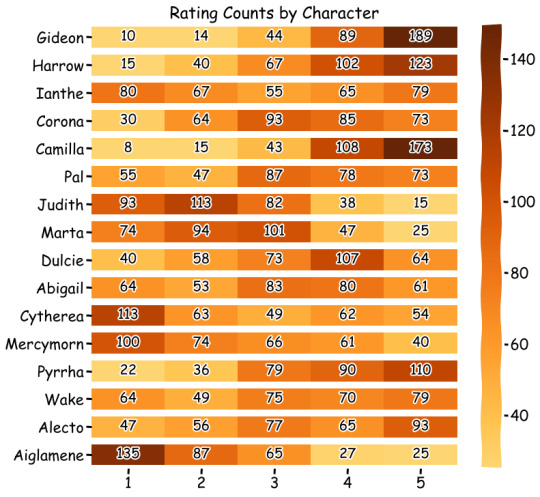
This is one more way of thinking about the distribution of answers each character got. I would have expected Ianthe to be mainly 1’s and 5’s, but she’s actually fairly neutral all the way through – nobody really has much of a bimodal distribution. Ianthe does have equal numbers of 1’s and 5’s, however. In contrast, Alecto’s 5’s outnumber her 1’s at a 2:1 ratio, and Gideon has nearly 20x the 5’s as 1’s.
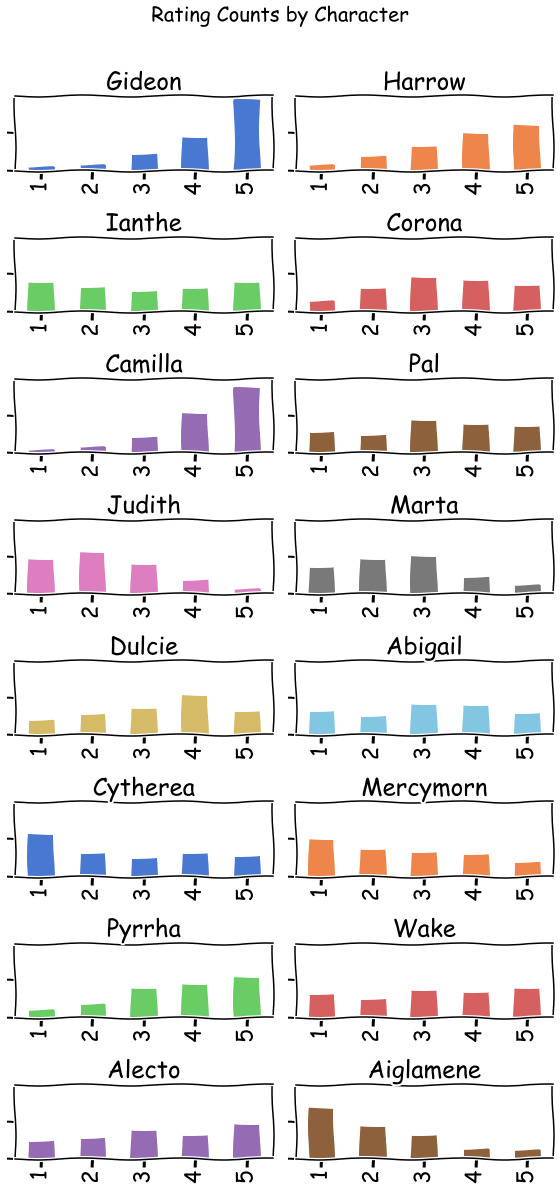
Section 3: Ratings Given Ratings
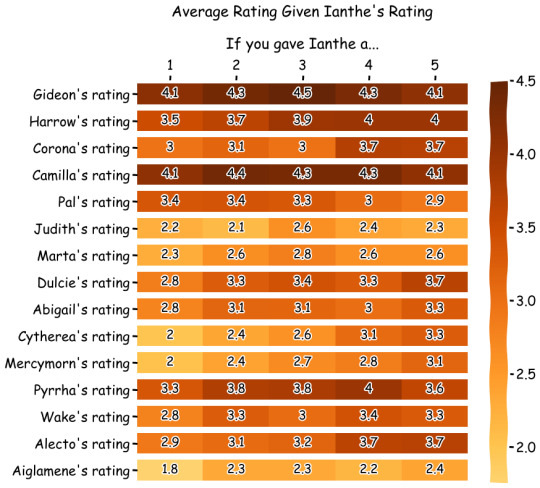
Are Ianthe girls really so different from everyone else? Maybe a little. The people who rated Ianthe highly were also higher on Dulcie, Cytherea, Mercymorn, Pyrrha, Wake, Harrow, and Alecto– pretty much every morally gray girl on the list. Judith, Marta, Camilla, and Gideon don’t see much of a difference – and Pal goes down!
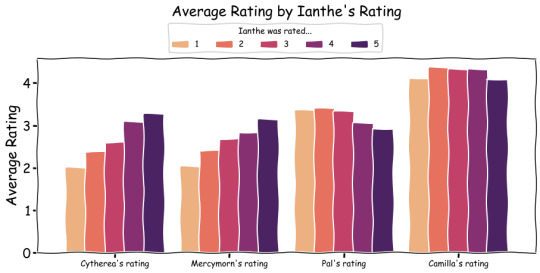
Here’s one way we could look at this up close to see the change.
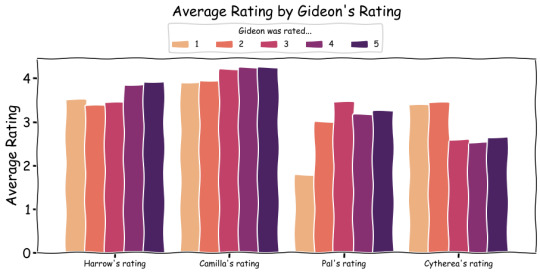
This is the same chart from a Gideon perspective! As you can see, Gideon’s rating doesn’t really change Harrow or Camilla very much – their ratings are pretty high across the board without a lot of change. Pal has a stronger connection: if you rate Gideon a 1, chances are you rated Pal pretty low too. The reverse is true with Cytherea: the people who rated Gideon a 1 rated Cytherea more highly.
Section 4: Correlations
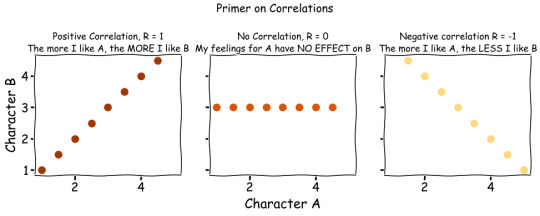
This is a correlation matrix! Each cell in the table represents the strengths of the relationship between the row and column character, between -1 and +1. +1 represents a relationship that totally corresponds with each other, 0 represents no relationship at all, and -1 represents a relationship that goes the opposite way. Each character has a perfect relationship with themselves, so there’s a diagonal of “+1’s” going from top left to bottom right.
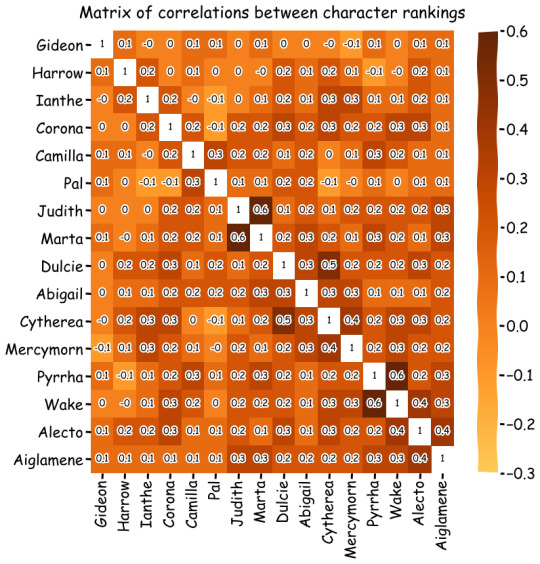
Section 4A: Top Positive Correlations
They go together, like rama lama lama ka dinga da dinga dong
Top Positive Correlations
Judith->Marta 0.63
Pyrrha->Wake 0.58
Dulcie->Cytherea 0.47
Wake->Alecto 0.44
Cytherea->Mercymorn 0.41
Alecto->Aiglamene 0.39
Dulcie->Abigail 0.34
Judith->Aiglamene 0.33
Ianthe->Cytherea 0.32
Cytherea->Wake 0.31
Abigail->Mercymorn 0.31
Marta->Aiglamene 0.31
Mercymorn->Wake 0.31
Wake->Aiglamene 0.31
Corona->Wake 0.31
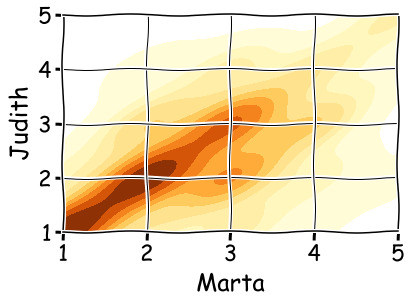
Our second house girls go together! Yes, mostly people both voted them 1’s, 2’s, and 3’s, but people generally ranked them the same.
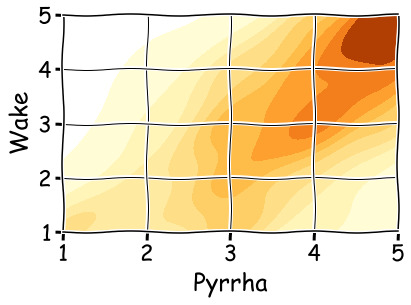
Our next strongest pair is Pyrrha and Wake. Most people put them both at 5, but people who were negative or lukewarm tended to be similar on both. Probably because they are terrifying warrior MILFs.
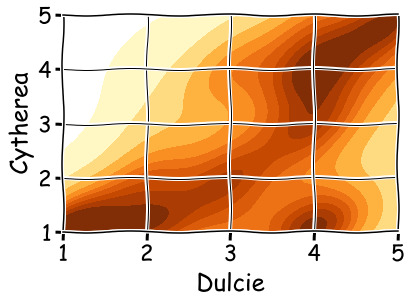
This Dulcie and Cytherea one is funny because we have 3 very different points happening. People who hated both, people who loved both, and a minor contingent of people who loved Dulcie but hated Cytherea. That last contingent is significant enough to show up, but not enough to throw off the correlation.
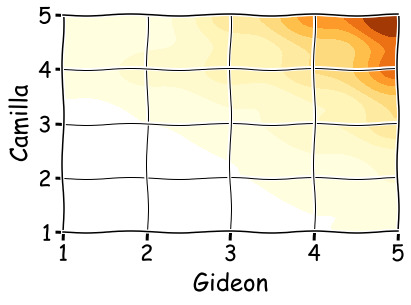
What do Gideon and Camilla look like here? There’s nowhere for us to draw a line–almost everyone put them both at a 5. True, some people rated one a 4 and the other a 5–but not enough for us to see a pattern from it.
Section 4B: Negative Correlation
Opposites…. repulse
Top Negative Correlations
Corona->Pal -0.14
Ianthe->Pal -0.13
Gideon->Mercymorn -0.12
Gideon->Cytherea -0.08
Harrow->Pyrrha -0.05
Pal->Cytherea -0.05
Pal->Mercymorn -0.03
Harrow->Marta -0.02
Harrow->Wake -0.02
Harrow->Pal -0.02
Gideon->Ianthe -0.02
Ianthe->Camilla -0.01
Gideon->Abigail -0.01
Camilla->Cytherea -0.00
Gideon->Dulcie -0.00
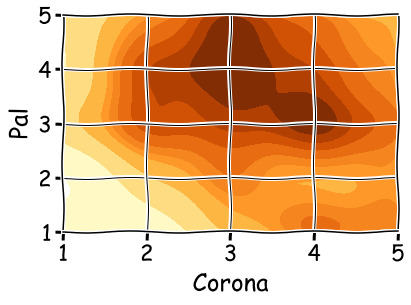
Basically, this correlation exists because there are two different groups – the people liked Pal and put her at a 5 or 4, tended to rate Corona a 3, and the people who liked Corona (who put her at a 4) tended to rate Pal a 1 or 3.
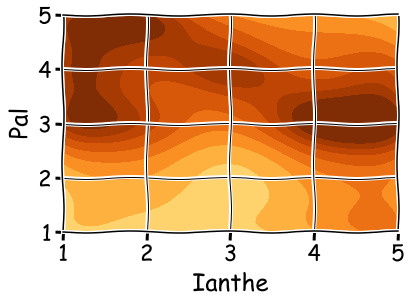
Pal and Ianthe are also kind of opposites! In this case, there’s a VERY pro Pal contingent (3-5) that all rated Ianthe a 1, and a generally pro Ianthe faction (who rated her 4-5) that was pretty lukewarm on Pal.
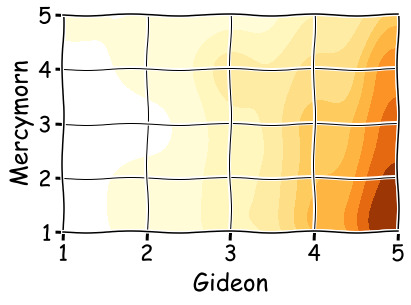
Lastly, a totally different pattern: Gideon and Mercymorn. In general, everyone was very positive on Gideon and very negative on Mercymorn, hence our major dark spot at (5, 1). This correlation isn’t as strong, since most people loved Gideon regardless of how they felt about Mercymorn. But there were just enough contrarians who loved Mercymorn and disliked Gideon to give us a negative relationship.
Section 5: Clustering
What if we pretended to do some fancy machine learning, and tossed these into a clustering algorithm?
Two Clusters
Abigail & Aiglamene & Cytherea & Ianthe & Judith & Marta & Mercymorn
Alecto & Camilla & Corona & Dulcie & Gideon & Harrow & Pal & Pyrrha & Wake
If we tried just two clusters, we can see a split like this. I’d call this line the conventional heroines VS the meaner, more frightening and military women.
Three Clusters
Abigail & Alecto & Corona & Dulcie & Ianthe & Pyrrha & Wake
Camilla & Gideon & Harrow & Pal
Aiglamene & Cytherea & Judith & Marta & Mercymorn
We can see a pattern here too:
Supporting characters with some redeeming features and some problems
Main heroes
Mean older women
Four Clusters
Abigail & Cytherea & Ianthe & Mercymorn
Alecto & Corona & Dulcie & Pyrrha & Wake
Aiglamene & Judith & Marta
Camilla & Gideon & Harrow & Pal
Breaking this down into 4 gives us similar slices again.
Older and/or Dangerous women
Bitches horny for revenge, probably
Military women
The Camilla/Gideon/Harrow/Pal quadrilateral of friendship
Five Clusters
Cytherea & Ianthe & Mercymorn
Alecto & Corona & Pyrrha & Wake
Abigail & Dulcie & Pal
Aiglamene & Judith & Marta
Camilla & Gideon & Harrow
Last one! Rolling around 5 clusters we get:
Morally dismal lyctors
Women who’ll try killing the emperor in book 3
Friendly but dead nerds
Military women again
Our heroes
Bonus: Harrow or Gideon?
Can we bring back the simple times of the Twilight fandom? Can we be divided into team Harrow or team Gideon? We turn to the data to find out.
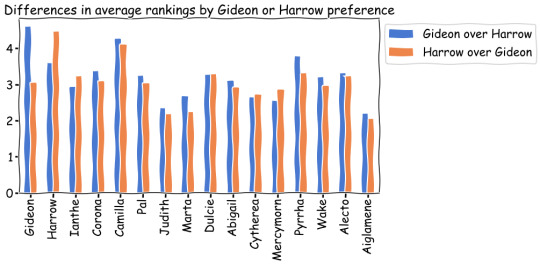
Gideon vs Harrow isn’t a very big divide either, as it turns out. The biggest effect it has is (drumroll)…that people who ranked Gideon higher than Harrow had high rankings for Gideon, and vice versa. Everyone else is fairly similar, and I wouldn’t put money on them being statistically significant.
Though there is a slight preference for Ianthe from the Harrow faction, and for Corona from the Gideon faction, which is definitely funny.
We can also observe some slight team Gideon preference for Judith, Marta, and Pyrrha.
285 notes
·
View notes
Photo
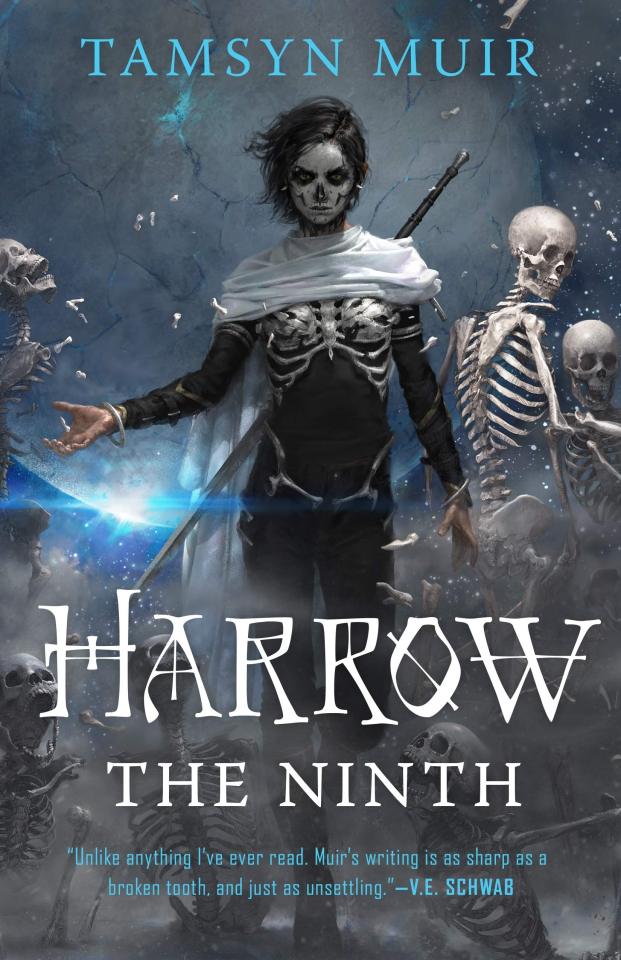
REVIEW OF...
💀 💀 💀 HARROW THE NINTH 💀 💀 💀
HARROW THE NINTH is the second book in Tamsyn Muir’s Locked Tomb trilogy, following on from GIDEON THE NINTH. If you’ve read the previous book, you’ll already be familiar with the main character, Harrowhark, but for anyone else, let me say by way of introduction that she’s a space-faring necromancer, whose hobbies include conjuring skeletons from bits of bone... and making soup, because in the words of the Emperor of the Nine Houses (aka God), “It’s the little things.”
Now a Lyctor (one of the Emperor’s elite bodyguards) Harrow travels to the Emperor’s space station and begins training to join his fight against planetary ghosts, alongside her hated rival, Ianthe. She is aided by a set of notes in sealed envelopes which can only have come from herself, but which she has no memory of writing. Her new life turns out to be far from easy, however. She cannot touch her sword without vomiting and is convinced she is going mad. Her mentor, the joyless Saint of Joy, despairs of her, the Saint of Duty wants to kill her, and Ianthe keeps flirting with her despite her very obvious lack of interest. The threat of battle looms and the general consensus among the other Lyctors is that Harrow will prove to be a hindrance rather that a help.
Interwoven with this storyline is a retelling of events from the GIDEON THE NINTH minus Gideon herself. Taking her place is a cowardly cavalier called Ortus Nigenad, whose love for quoting epic poetry provides some nice comic moments. I won’t tell you the reason for the change, because it would be a major spoiler, but it is explained towards the end of the book.
I found the shifts between the two narratives could be a little disorientating, but they work for the story, as they give you a good sense of Harrow’s fractured state of mind, and you quickly learn to distinguish between the two, as one is written in the second person and the other in the third. I’m not a big fan of second person narration on the whole, but it fits well here and there is a good reason for it… which I’m not going to tell you, as again, it would be a major spoiler.
HARROW THE NINTH is a great book. There are gory parts, exciting parts and genuine laugh out loud moments, especially around Ianthe. Harrow and her have a complex relationship, which is beautifully handled and produces some great dialogue, like when Harrow tells the Emperor, “We—are not—intimate… Neither are we romantic—neither are we, frankly, platonic—”. There is also great comedy in Harrow’s meetings with the Emperor, the Saint of Duty’s murder attempts and the Saint of Joy’s references to Harrow and Ianthe as increasingly young children. The characters in the book are all memorable and the interaction between them feels very authentic. I loved the way the Emperor and his older Lyctors are constantly bickering, for example.
The book’s biggest strength is probably the world-building, however. The environment Muir creates is as fantastical as any I’ve come across, but it’s so immersive that it really comes to life. There are sensory descriptions throughout (e.g. the references to the mysterious smell of upchuck and the strange aftertaste to thousand-year-old food kept necromantically pure) and careful thought has obviously been given to the mechanics of necromancy, etc.
All in all it’s a book I would definitely recommend. It provides an intriguing perspective on a range of themes, including life, death, relationships, power, fear, madness, secrets and sacrifice, and is exciting and unusual. It’s not the easiest of reads, but if you let it draw you in, you’re in for one hell of a ride. A word of caution, though – you probably need to read GIDEON THE NINTH before you start on it, or you’ll struggle to make sense of it. That’s all I’m going to say for now, but watch this space for my thoughts on the final book in the trilogy. Not sure when this is going to be released, but I’m looking forward to it greatly.
#harrow the ninth#harrowhark#harrowhark the ninth#gideon the ninth#gideon#tamsyn muir#science fiction#science fiction novel#sf#lesbian science fiction#lesbian literature#wlw#follow back#follow for follow#follow#like for like#christabelq#christabel#christabel simpson#chrissy simpson
8 notes
·
View notes
Text
Harrow the Ninth Act I Thoughts
This is all your fault, @ghostmartyr. If you hadn’t reblogged what seemed like heavy metal boy band fanart, I wouldn’t be in this hole. And for that, I hate you.
So.
When I first encountered the Locked Tomb online, I couldn’t tell if it was a story about edgy, neogothic, teenaged angst, or something better than that.
Turns out, it’s both.
But in a good way.
I love it. It’s great.
It’s unabashed, it’s thoughtful, it’s entertaining, it’s suspenseful.
Gideon the Ninth is finished, and after starting Harrow the Ninth, I decided to blog about it as I go.
I’ll be doing one post for every act of the book. I hope.
Let’s start with our new main character, Harrow. Newly reborn as a god and one of the only survivors of the last book.
So….
Right now, Harrow’s…
Um.
She’s uh…
-gestures at everything-
She’s fucked.
Fucked, broken, in the shit, started godhood on the wrong side of the bed.
200 babies were killed in the name of birthing her. Her parents died in front of her because of what she did. Death has always seemed to follow her, and she carries the burden of all that death.
Harrow despises her existence and wishes she were dead because of the circumstances of her birth, and yet for that very reason she is committed to living, because if she dies, all those sacrifices would be null.
She takes up the duties of governing the Ninth, she applies herself rigorously to mastering necromancy, and when the opportunity arises to become a lyctor, she jumps at it.
Harrow does this because it’s why all those people had to die. She was birthed to carry the Ninth’s legacy; its traditions and obligations and to some extent its very existence.
The twisted nature of the Ninth and her parents is inseparable from that legacy, so in a sense it was that legacy that led to her infanticidal birth, but regardless, this legacy is all she has. It’s all she was ever meant to have. And so she devoted herself to it.
Now that she’s a lyctor and her house’s future will be guaranteed, but to do it, she had to sacrifice Gideon, whom she loved.
It’s more of the same shit from her perspective: more people dying for her sake. 200 babies die to grant her obscene necromantic talent, her girlfriend dies so she can gain even more power. Harrow doesn’t mean to step on innocent people to get what she wants…but that’s always how it’s turned out for her.
But to add insult to injury, even after all she’s sacrificed, she still didn’t get exactly what she wanted.
Her house will have a future, but she can never return to it. She’s essentially divorced from the only thing that gave her life meaning.
She can never return to her old life; to the extent she saw that as desirable, she can’t have that. Her old life is gone forever.
Something also went wrong with her ascension to godhood. She’s violently sick, mentally unstable, and the powers she should have are…half baked, for lack of a better word.
Nobody said you could get hungover from ascending to godhood. Harrow should sue.
It’s like going in to surgery to remove a tumor and coming out lobotomized.
Is she even immortal?
It all stings of pointlessness. All that effort for nothing.
Worse than that; She lost everything. Her home, her love, her pride and dignity.
Her only purpose in life now is to fight these hell beasts that she’s never heard of before. Happy days ahead, surely.
Oh, and one of the people she’ll have to work with is named Gideon.
Does God hate her?
And then there’s God.
This guy is sus as hell.
He’s gracious and humble. Perpetually calm and soft spoken. Empathetic and understanding. That’s what He’s like in person.
But He’s…maybe the villain? I guess.
God works in mysterious ways, and I have no damn clue what His are, but it’s probably ugly.
Yes, He’s a cordial Dude…but he’s still the God-emperor of a galactic undead empire.
Dude wears a crown made from the bones of dead babies FFS.
Not to be accusatory, but this guy definitely has skeletons in his closet.
-bu-dum-tish-
One of the things that really got my attention while reading this series is how the magic system in this world is depicted. Usually, in fantasy stories, the magic system is depicted as being morally neutral. Good guys use it, bad guys it, but the magic itself just is.
The Locked Tomb Trilogy isn’t like that.
Necromancy is bad. Perverse, even.
All the necromancers are frail and sickly. Practicing it is deleterious on the body. Doing too much too fast with it causes even more pronounced harm. As in, bleeding from your sweat glands.
Necromancy works by manipulating the life force of living beings and, primarily, the death force those being give off when they die.
The forces of nature that necromancy utilizes are (apparently) fundamental to the universe, akin to the laws of nature, but the use of those forces in this way are clearly a perversion.
It’s sort of like a bad tv show, like Sword Art Online. Sure, the things that went into making the show are natural parts of the world, but you just can’t put those things together like that.
John and his empire epitomize that.
All known beings in the universe are fundamentally thalergetic in nature. They are beings who radiate life energy. Except for the planets of the empire. Those planets and the star they orbit are thanergetic in nature.
They literally radiate death. And they are apparently one of a kind in that regard.
John is the first necromancer. John used his newly harnessed powers to “resurrect” multiple planets that had died.
Except he didn’t really resurrect anything, he turned them into an entirely new form of being using his entirely new form of science that uses some kind of mechanism that doesn’t occur naturally.
What I’m getting at here is that everything about John, his power, and his empire is artificial. Man-made. Perhaps even John-made.
We don’t actually know what happened during the Resurrection. What killed off the planets, how John attained his God-like powers, and what life John lived before it.
Oh, yeah, and every planet the empire conquers is systematically killed over generations to fuel their necromancer’s powers.
Every planet God touches literally dies.
One thing I appreciate about this series is how layered the story is.
The Locked Tomb series is a fun, irreverent romp. It’s about allowing the past to rest in peace. It’s also surprisingly political.
The metaphor is pretty blunt: it’s about capitalism. What’s more, the metaphor seems to be from a progressive or maybe even socialist perspective.
Ok, so hear me out on this. This is less fan theory than speculation about the author’s intentions.
The empire is a society built on a system that requires them to move from planet to planet, gradually killing those planets until they have to evacuate and move to a new one.
This process of gradual death takes generations to play out, so apparently they don’t even consider it to be an event that happens.
The heart of this system is necromancy, a perverse science that is ultimately derived from natural phenomena.
This system places the most powerful necromancer atop a literal throne and worships them as God.
God’s disciples are the lyctors, second only to Him in power. They attained that power by a very special process.
The lyctoral process is exploitative. It requires the necromancer to use their cavalier as a sacrifice and to turn their soul into a power source.
The lyctoral process is built around domination. The necromancer, in sacrificing their cavalier, subsumes the cavalier’s soul into their being to gain power.
The lyctoral process is dehumanizing. The cavalier is degraded from a person to a mere battery, but the necromancer is degraded in a way as well. The necromancer can never return to their house, or any of the other houses for that matter. Instead they must fight and die for God in his battle against the Revenant Beasts.
If you’re progressive, this may sound familiar to you.
Relationships of exploitation, domination, and dehumanization. A society built around perversions. That rewards people with talent in those perversions with idolatry. That cold-heartedly and shortsightedly extracts every drop of usable resources from a planet until it is dead, then moves on to the next one.
To a socialist, this may sound a lot like capitalism.
Saying that is already bold enough for me, so I won’t try to argue that it’s a one to one allegory. Necromancy equals the profit motive, lyctors represent the relationship between the bourgeoisie and the proletariat (So I guess that means the non-lyctor necromancers are the petit bourgeoisie) and the empire is humanity.
You could make a case for it, but the hot takes in this post are already pretty spicy, so…
OMG Mercymorn. XD
Mercymorn is my favorite out of the new characters. She’s a bitch.
Snide, rude, assertive, bitchy, and standoffish. No, it’s not that I want her to step on me, I just can’t get enough of her interactions.
I guess in real life she wouldn’t be fun to be around, but as a character in a book, she steals every scene. Her arrogant and bitchy remarks always make me laugh.
My one wish heading in to Act II: that Mercymorn is in charge of Ianthe’s training.
Just so she can kick her ass for not measuring up to her standards.
2 notes
·
View notes
Text
masterpost of fix-it headcanons for AC0TAR
the only day you can add onto this is e v e r y day
this blew up into a huge thing and it’s no longer just headcanons but more a reworked outline/embellishment of the first three books. feel free to add or change what you want if you make it through the whole thing :D
n/esta--a gray ace icon!--is the main character. the first book is told in n/esta and l/ucien’s alternating POVs.
some worldbuilding and character background for human lands because sj/m provides fuckity nothing: mama and papa arch raised their children on scary stories about the fae. the first story every human child hears is the one about the human-fae treaty and the ominously growing rip in the wall between human and fae lands. (as a young woman, n/esta remembers a time when a fae attack would happen once every few years, but now she hears of five to ten a year.) because humans are atheist, the arch sisters also learned many stories about secular historical figures and events such as j/urian and his legendary murder of c/lythia during the human-fae war, and f/eyre took an interest in famous painters from a young age.
mama arch died and papa arch’s leg was irreparably damaged while protecting their daughters from a fae creature attack. the girls developed growing resentment toward fae as they got older.
after their family’s fall into poverty, n/esta and e/lain grew up helping f/eyre learn to read. she'll never be at their level, but she knows enough to get by. n/esta always budgets and goes shopping. the harvest from e/lain’s little garden has saved them a few autumns, just like f/eyre’s hunting. their father loves them and wishes he could do more, but they're happy to care for him.
actual ac0tar timeline: (because the humans deserved a plotline and i’ll die mad that they never got one:) the human lands are deeply unsettled by the hole in the wall, and a few attacks have ravaged the northernmost villages. f/eyre is taken to p/rythian. n/esta and e/lain find the mercenary who helped f/eyre. the mercenary is an important mentor for them and she helps n/esta leave tomas. e/lain’s fiance g/raysen who is completely justified in his wariness against fae fiGHT ME sj/m is an advocate for human rights, and all his family’s resources are helping mend the wall, but they just can’t do it without magic. e/lain stays at home to take care of papa arch while n/esta heads north with the mercenary to save f/eyre and possibly find a magical solution to the wall. unsuccessful, n/esta returns home to find that her family has suddenly come upon fortune again, and she funnels some of that money into the human effort.
meanwhile in the sp/ring court, l/ucien watches as tom lane brings home a human girl, f/eyre, who may just be the key to defeating a/marantha’s curse. the curse forbids him from warning her about tom’s true nature, and his feelings toward tom are difficult because tom has provided him shelter from his family but has also been another source of abuse. l/ucien also resents f/eyre for murdering andras. both trapped and opposed to each other for different reasons, f/eyre and l/ucien begrudgingly become friends. they look out for each other and a/lis.
throughout book 1, l/ucien mourns andras and carries out his duties as tom’s emissary. he visits utm multiple times, discreetly conversing with all the imprisoned high lords and their spies (maybe a/zriel and/or n/uala and c/erridwen makes a cameo here) and spreading the news that the curse may soon end. every time he returns, the high lords inform him on their movements/preparations for a/marantha’s death and h/ybern’s rise.
f/eyre completes her third task, but her stab to tom’s heart is fatal. tom dies honorably, for the greater good of all the fae, but l/ucien and f/eyre will never forget the darker parts of him. because a/marantha deserved better as a villain, a/marantha disappears in a diversion created by the king of h/ybern (hereon known as “koh”). rice is a straight-up antagonist and kidnaps f/eyre into the night court. l/ucien is left to rule the s/pring court alone.
ac0maf timeline: the second book continues l/ucien and n/esta’s POVs but also introduces t/arquin, m/or, and a h/ybernian’s POVs.
the h/ybernian pov (perhaps a commoner, soldier, or advisor to the koh) gives us insight on the koh and a/marantha’s plans. both the koh and a/marantha are given thorough backstories that make them sympathetic and/or interesting villains. the latter is one of many lethal commanders in the h/ybern army, alongside d/agdan and b/rannagh. her bitterness against humans has been renewed upon her defeat by f/eyre. the h/ybernian perspective also allows us to see h/ybernian culture, history, and pro/anti-war factions so that h/ybern is no longer a monolith. at some point, we see the cauldron come together. its power is immense.
now, let’s add some semblance of conflict and flaws to the inner circle. (i tried to stick as close to the canon as possible here, but again, mess provided FUCKITY NOTHING.) they each have differing motives, but at the end of the day they all just want prythian to be safe. they’re actually morally ambiguous anti-heroes/villains as heroes instead of this “it was all an act” nonsense. i/llyrians are explicitly poc. rice kidnapped f/eyre not because they’re mates, but because he wants to use her newfound powers as an asset against h/ybern. a/zriel’s torture victims never recover, but he only ever resorts to such measures when he believes necessary. a/mren (agender; ace) hunts for their blood, and they have an insurmountable body count. m/or (power lesbian) is incredibly kind, but everyone in court knows not to get on her bad side or they’ll face her justice. c/assian is the most ruthless commander i/llyria has ever seen.
additionally, the inner circle is complicated. m0riel was never a thing. c/assian and m/or also never hooked up, but they are besties. a/zriel is the intuitive, emotional core of the group; everyone goes to him for advice on friends, relationships, and hard decisions. a/zriel (pan) and c/assian (bi) have been steadily falling in love since their time in the camps as boys but neither of the idiots will admit it to themselves or anyone else. a/mren is still known as “tiny ancient one” because they’re like millennia older than everyone else. they impart cryptic wisdom and brutally honest advice on their edgy^TM kids. the night court also know their time with a/mren is limited because they are searching for a way out of their fae form, so their company is cherished. the four of them have stood beside rice over the centuries, and they love him, but they’ve also watched him steadily become more corrupt and merciless. can he be saved or is it time for a change in leadership? this is a conversation everyone wants to have, but no one is brave enough to begin. everyone skirts around it throughout the book, tension slowly building to an inevitable confrontation.
moving on to the plot: in the night court, we follow m/or ruling v/elaris (she fucking f i n e s s e s k/eir in the process). she’s in a simmering, slow burn romance with an i/llyrian woman: an activist against wing-cutting and a mutual friend of a/zriel’s (he set them up). m/or’s strength in court is her kind nature. she has many loyalists in the court of ni/ghtmares who know of her past with e/ris and k/eir. meanwhile, a/mren and f/eyre's subplot takes them to the human lands to get in touch with the arch sisters.
after his time utm, t/arquin returns to the summer court to play his part in preparing for the war against h/ybern: translating his half of the book of breathings and gathering powerful allies (br/yaxis, the b/one carver, and the w/eaver) for the war. his emotional arc is all about his recovery from the trauma he underwent utm. meanwhile, c/resseida hears word that some night court members are headed to the human lands, so she initiates an alliance with them and tags along in hopes that she can retrieve the mortal queens’ half of the book.
in the spring court, i/anthe is introduced. l/ucien soon realizes she is a double agent for h/ybern. she feeds him info on recruitment and battle strategies. koh and a/marantha are depending on i/anthe’s priestess order to spread pro-war rhetoric across h/ybern (??? this is the best i could do with what sj/m gave). the human lands are the most at risk because koh plans on cutting his army directly through spring court to crush the laughably weak human resistance before taking over the south. (sources report the effort is headed by the cursebreaker’s older sisters....)
in the human lands, n/esta and el/ain are pleasantly surprised by a visit from their sister, and more than a little alarmed by the two fae who accompany her. f/eyre just missed papa arch, who recently set sail with some of g/raysen’s soldiers to recruit southern soldiers. human efforts to seal the wall have been mostly fruitless, and every victory pyrrhic. although neither sister is a fighter, n/esta and e/lain have both seen enough horrors to last a lifetime. n/esta has worked her way to the position of treasurer of g/raysen’s army, and it seems that the proximity of the wall has activated some magic in elain so she is now a seer (this is some bs but so is sj/m’s magic system smh i tried). therefore, both of them (plus the mercenary) always sit in on war councils, and they receive a formal invitation from the mortal queens to discuss their next movements. a/mren and c/resseida come along, and the queens agree to give their half of the book in exchange for some fae magic to mend the wall. only m/or is powerful enough to do such a thing (also bs but sj/m never explained her power!!), so they must go back to the night court. amidst all the suffering, one good thing boosts human morale: e/lain and g/raysen's marriage.
in the n/ight court, a/mren, c/resseida, and f/eyre return to merge the book and tell m/or of the deal with the queens. tensions have risen between m/or and rice’s ruling styles. the court of nig/htmares is also split between m/or and k/eir. too much is mounting for mor to even think of going to the human lands. she and a/zriel also recently received a request for help from l/ucien: one of the spring sentries reported that amarantha’s legion is on the move. meanwhile, the h/ybernian pov chronicles the legion traveling to spring. the best the n/ight court can do is send c/assian. l/ucien and c/assian do all they can, but a/marantha’s too powerful and she rips right through the hole in the wall. c/assian’s wings get fuCKING SHREDDED in the process.
acowar: we’re gonna pretend v/assa, m/iryam, and d/rakon don’t exist bc they did very little for the plot. pr/ythian is in all out fucking bloody-ass war. when war crimes are committed, characters are held accountable. spring fae are scattering, seeking refuge in other courts. we see true horrors and battles and loss throughout the book. it’s high time that the lords all convened to lay out a plan of action, but everyone’s had pretty big fish to fry in the post-curse era. the n/ight court is fracturing, t/arquin and l/ucien are adjusting to being high lords, the a/utumn court has always been infighting, etc. so now an effort is being made to call everyone to a council in dawn.
first, m/or can no longer ignore the call to the human lands. l/ucien joins her because of his lands’ proximity to the wall, leaving i/anthe in charge (they’ve become quite good companions and she’s cut off her ties to hybern). c/assian also comes because l/ucien has been harboring him in spring and providing the best possible (but insufficient) healers for his wings. finally, our human and fae plots come together. m/or and c/assian’s reunion is touching. c/assian’s banter with abrasive n/esta takes his mind off his damaged wings. they both enjoy each other’s pragmatism, sarcasm, and emotional empathy. (in another life, they might’ve made a good match ;).) m/or patches the wall because even though a/marantha is already through, it’ll stop reinforcements from joining her. in a historic event, humans (the queens, the arch sisters, and g/raysen) are invited to the council of high lords.
all our big players are at the council: all h/igh lords + partners and courts, plus terrified but dignified human squad. m/or is reunited with her old friend v/iviane, (they were DEFINITELY a thing once). k/eir, e/ris, and b/eron were invited by none other than rice, who also plans to use feyre’s powers to win multiple battles. the n/ight court can no longer deny that it’s time to talk about rice. all the rising tensions come to the surface here. rice wants to employ the [insert better name for keir’s soldiers than fucking d/arkbringers], but m/or’s i/llyrian gf has been raising an army and she thinks that’s the safer bet. in the end, all the high lords decide they need both, and no one is quite happy. no one knows wtf is in the future for n/ight court leadership.
human squad and fae recap each other. humans hope papa arch can come through with some southern support. amarantha is razing her way through human lands while a/driata and v/elaris have suffered attacks from koh. n/esta, e/lain, and f/eyre all share stolen conversations between meetings over the days. f/eyre misses her home and family, but she knows she’ll never belong there again. humans are given the d/arkbringers (yikes) and b/ryaxis.
as human squad + lucien make their way home, their caravan is attacked by a h/ybern commander--maybe d/agdan or b/rannagh. e/lain is kidnapped to the koh’s camp; she’ll be a good hostage to draw in the pr/ythian asset f/eyre and crush human spirit. the h/ybernian notes that the cauldron has amassed much more power than we last saw. however, koh’s power over the cauldron and his soldiers has been spiraling out of control ever since a/marantha left to attack humans. though she’s been successful against them so far, her obsessive desire to slaughter humans wastes a lot of soldiers & resources on lands that are of little use to h/ybern. the h/ybernian gradually becomes acquainted with e/lain and frees her from the camp. humans return home shaken, but without further incident. the diversion has given a/marantha enough time to secure g/raysen’s lands before they arrive.
in the night court, they realize that without b/ryaxis they’ll need to free a/mren from their body for once and for all to defeat koh. they all share one last night of drinking, games, and being silly and sad. a/zriel and c/assian ruminate on the possibility of losing other inner circle members, and realize their feelings for each other. when h/ybernian and p/rythian forces assemble for the final battle, rice dies an anti-hero’s death on the battlefield. c/assian commands i/llyrian infantry nobly and courageously while m/or’s gf commands from the skies. f/eyre uses her powers to the best of her ability, and with significant help from a/mren in their true form, wins the day for p/rythian. a/mren disappears into their original desired dimension, and f/eyre dies knowing that she neither belongs with humans nor fae. c/resseida, t/arquin, and some p/rythian court members survive, but not without suffering scars, limb loss, and casualties etc.
in the human lands, papa arch has returned from the south with a few thousand men, but not enough to face a/marantha. the d/arkbringers and b/ryaxis hold their own against her soldiers, but she herself still lives. echoing how f/eyre outsmarted a/marantha in book 1, the humans must utilize a/marantha’s own hubris to defeat her. a major human character dies: perhaps g/raysen, the mercenary, or a queen.
finally, the enemies are defeated. arch family and high lords are invited to a funeral for f/eyre cursebreaker in the night court. n/esta and e/lain mourn their sister, but the funeral as a whole serves as a commemoration of all the losses of the war. additionally, m/or and i/llyrian gf have a beautiful private wedding. in rice’s absence, the courtiers of dreams and nightmares flock to m/or. now that their power is secure, she and l/ucien hold long overdue but fair trials against e/ris, b/eron, and k/eir for what they did to m/or and j/esminda (l/ucien’s lover who was killed before his eyes). they are found guilty, and a/zriel uses his sword truthteller in the execution. after, everyone settles terms and plans for war reparations. all the courts vow to donate what they can to the human lands because they all bear the responsibility. the humans go home one last time. human and fae alike are deeply traumatized by the war, but there is hope of happiness and recovery in the future.
#anti acotar#anti acomaf#anti acowar#anti sjm#this was SOOOOO much harder than the t0g one because the ac0tar plot/world/characters are so much weaker than the t0g ones#and that's really saying something#there's almost nothing to the worldbuilding holy crap
89 notes
·
View notes